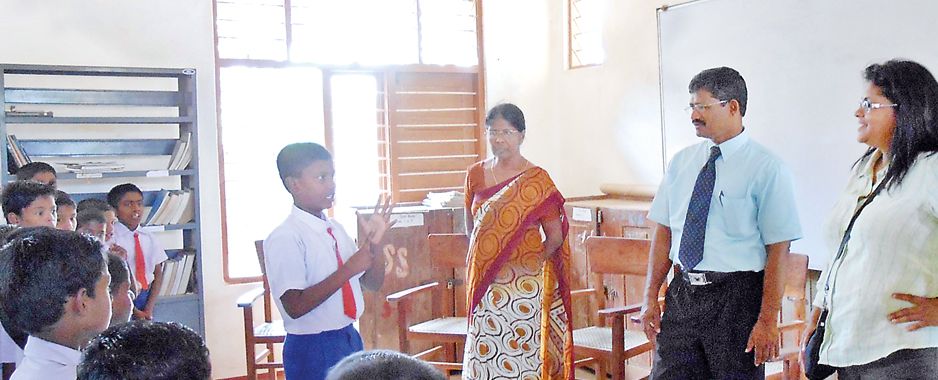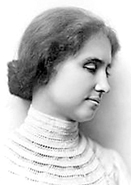Reading the signs
She was born with acute deafness. But that did not stand in Shamila Kurukulasuriya’s way. The young mother of Sri Lankan origin leads a full life in Washington DC. Her handicap notwithstanding, Shamila resolutely continued with her studies graduating from the best of Universities for the hearing impaired in the USA.
Today, this highly successful professional woman, running her own graphic design company in Washington DC, has a passionate yearning – to use the advanced learning she received in exclusive American Universities to bridge the gulf deaf children of Sri Lanka face with the ‘hearing world’ through sign language.

Shamila (far right) with hearing impaired children and their teachers at the Nuffield School for the Deaf in Jaffna
Shamila graduated from the premier University for the Deaf in USA – the Gallaudet University in Washington DC established after the civil war, by Abraham Lincoln himself. She was thereafter, amongst the first deaf students to be enrolled at the Savannah School of Art and Design in Savannah, Georgia. Thus, well equipped and fully aware of the value of communication, she says that the near complete absence of any kind of education or communication during the formative years of deaf children, relegates them to lives of missed opportunities, social isolation and poverty. The campaign of building bridges Shamila has just begun island-wide encompasses deaf children of all communities – Sinhala, Tamil, Muslim and others and her earnest wish is to see that they achieve their full potential in effective communication.
Shamila says that the involvement of parents and extended family is an essential part of the development of a hearing impaired child – this, she says, unfortunately sometimes does not happen. Unless deaf children start learning before they start schooling, they will lose their chances in life.
Already, five trilingual, attractively-illustrated books have been launched for pre-school children with lessons in Sign Language. Two more are currently in the process of publication. If deaf children, in the first six years of their life, achieve the same level of proficiency in communication, recognition, reading and writing-skills, as well as acquire the same basic knowledge of concepts, letters and numbers, as “hearing” children, they could be on par with the rest as they start formal education, Shamila says.
Her books are lessons in basic Sign Language titled Nishu @ Sign Language Workbook, which M.D. Gunasena offered to print and market, ‘not as a profit-venture but to give strength for those who cannot hear.’ Being a non-profit service to the deaf community, royalties from the sale of Shamila’s books will go into a Trust Fund which will be used for teaching deaf children and their parents in Sri Lanka. Shamila hopes to follow her initial series with several more, including videos and a website dedicated to deaf children.
Bearing in mind its humanitarian aim, several agencies have stepped forward to assist Shamila to effectively implement her dream. At the recent book launch, Chairman Synergen Health Pvt Ltd Walter A. Gunawardena and the General Manager, Denver Fernando with their team, being a solutions and services company serving the US healthcare industry, made a generous cash donation to the implementing agency – ‘Candle Aid”. Synergen has already carried out projects at the Deaf and Blind School in Ratmalana and donated essential educational needs to deaf students in Batticaloa. There had been many others too who had made similar donations to make these books available to deaf children who would not have been able to otherwise access them.
“Candle Aid,” has already distributed 2500 Sign Language books to parents of deaf children in areas such as Pottuvil, Tangalle and Anuradhapura. The author is overjoyed that over 1500 sets – 7500 in all have been donated to families from Matara to Jaffna and Batticaloa to Ratmalana. The Tamil Sign Language books in fact have gone into reprint which gives an idea of the impact of the project.
Shamila took around four years to consult with Principals and the staff of several leading schools for the deaf in Sri Lanka. She received help from a team of deaf teachers and researchers from all parts of the island, who demonstrated Sign Language on camera. She also received support from the National Institute of Education in Maharagama. Therefore, the Sign Language that Shamila has used in her books conforms to what is accepted in Sri Lanka.
A graphic designer by profession, Shamila has made her books pictorially ‘active’ and exciting. There has to be emphasis on visual details, Shamila says, as the deaf child uses only his eyes and relies on visual communication. Parents can use these illustrations when relating the story through sign language. These work books with lessons in letters, numbers, key words and phrases, are easy to use and fun to learn, so they can engage the entire family. Shamila’s sign language cuts across barriers. Whether one speaks Sinhala, Tamil or English the sign language that is used to communicate, has no disparity, even though their individual thinking is in a different language
Sign language is an accepted language today, on the same level as German, French or Japanese. Sign language interpreters are ‘sought after’ in developed countries by the older deaf students who pursue O/L and A/L examinations, Shamila says. More ‘hearing’ people therefore are being motivated to learn Sign language and are often employed as interpreters or to help deaf students who pursue the BA, MA or PhD degrees. Australian MP Helen Jarmer and the Queen of Sweden are two public figures who use sign language when making speeches.
Shamila believes that being deaf should not stand in the way of pursuing one’s dreams. “Other than hearing, we can do anything,” she says.
Deafness didn’t stop them
 Beethoven |
 Hellen Keller |
Many in fact, have reached eminence despite being hearing impaired. For that most famous German composer Ludwig van Beethoven, the inventor of bulbs Thomas Edison, American author, politician and activist Hellen Keller and the American Academy Award winner – Marlee Matlin, deafness had not been an obstacle to achieving greatness.
Follow @timesonlinelk
comments powered by Disqus


























